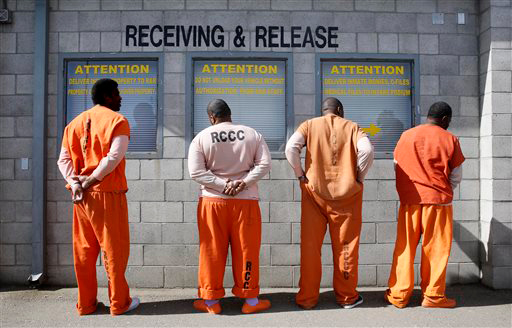The most recent surge in the Black Lives Matter movement has opened up the eyes of Americans everywhere regarding the inequities and injustice that Black Americans face on a daily basis. Now, recent findings are backing up these observations with alarming data.
The Sentencing Project’s recent report “The Color of Justice: Racial and Ethnic Disparity In State Prisons” brought unsettling news: Black Americans are 5 times more likely to be incarcerated in state prisons than white Americans.

The study found that “nationally, one in 81 Black adults per 100,000 in the U.S. is serving time in state prison.” To broaden the context, the NAACP states in a separate report that “one out of every three Black boys born today can expect to be sentenced to prison… compared to one out of 17 white boys.”
But Black communities aren’t the only ones treated unfairly in the American justice system. According to The Sentencing Project’s report, “Latinx Americans are incarcerated at 1.3 times the rate of white Americans,” a statistic that is likely to be overlooked for its seemingly small difference compared to white American incarceration rates.
New data, however, wasn’t the only update this report accounts for. It also painted a picture on how to bring change to unjust incarceration rates. The report’s three major propositions to bring about change are to “eliminate mandatory sentences for all crimes, require prospective and retroactive racial impact statements for all criminal statutes,” and “decriminalize low-level drug offenses-” all actions that will prevent minorities from enduring the dramatically high incarceration rates faced today.
To understand how these statistics affect black and Latinx communities, those who wish to contribute to change must first listen to what these communities have been and are currently communicating to the nation at large. One way to gain personal accounts of how unjust incarceration rates affect these families, tune into “Shutting Down Jails and Building Up Movements,” Episode 2 of the Black Lives Matter movement’s educational series, Imagining Abolition. Patrisse Cullors, founder of Dignity and Power Now and Co-Founder of the Black Lives Matter Movement, starts the video as followed:
“I think it’s important to start with 2011, which was me preparing for my brother to come back home from being in prison for six and a half years… I spent… six years trying to figure out what I needed to do to make sure that when [he] came back home, he was going to come back to conditions that were different. Not just in my own family but also in the county and the place, in Los Angeles, the place that created the misery for him in the first place.”
For perspective, California, which contains Los Angeles county, sustains a Black/white inceration disparity larger than 9:1. Oregon stands at a ratio of 5:6.
There’s a long way to go, but through education and action, Americans can put the “just” back into the justice system.



